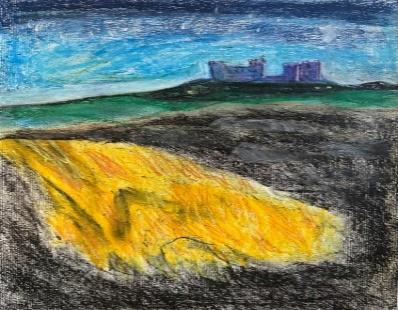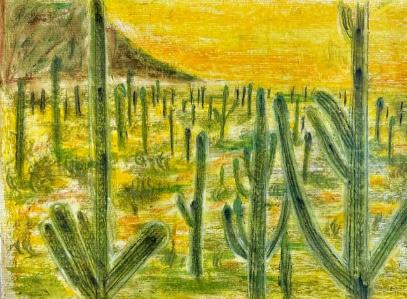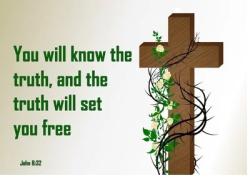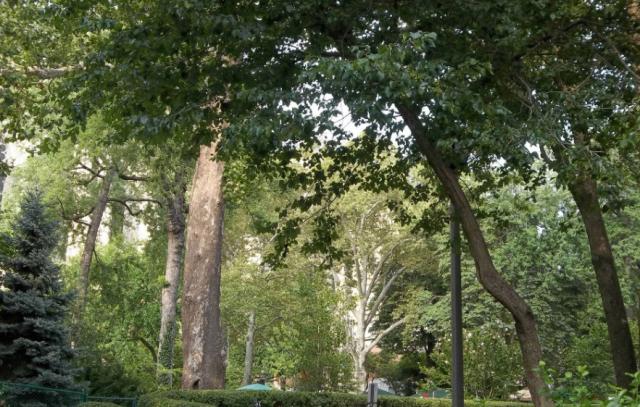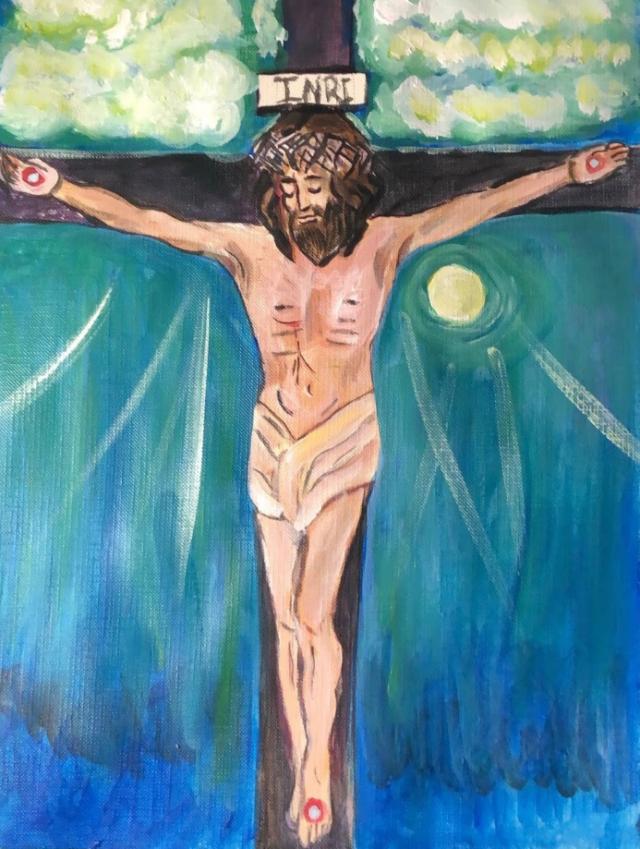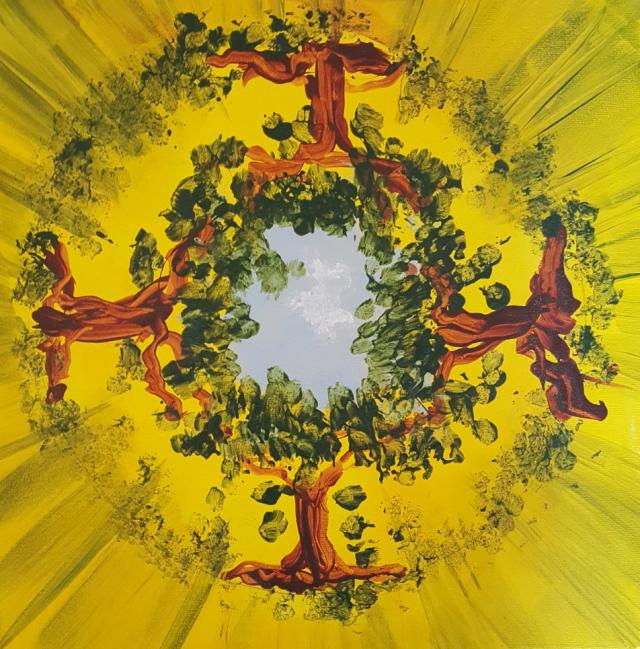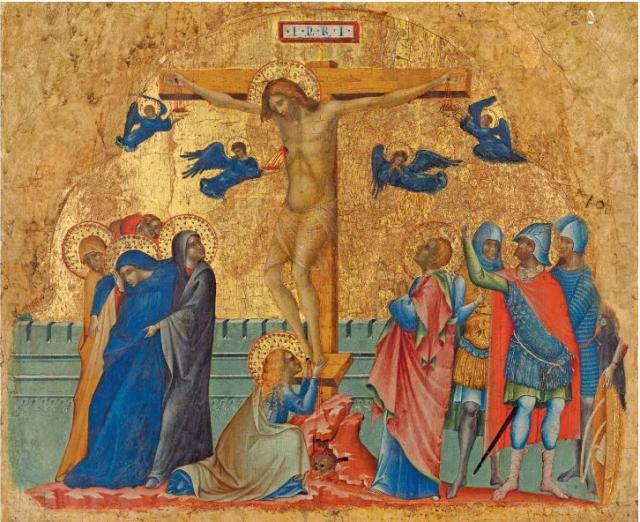Lenten Meditations 2023

I invite you,
therefore, in the name of the Church, to the observance of a holy Lent, by self-examination and repentance; by prayer, fasting, and self-denial; and by reading and meditating on God’s holy Word. And, to make a right beginning of repentance, and as a mark of our mortal nature, let us now kneel before the Lord, our maker and redeemer.
By the cross and passion of your Son our Lord,
Bring us with all your saints to the joy of his resurrection.
—The Book of Common Prayer, 1979
Ash Wednesday, Wednesday, February 22, 2023
Joel 2:1–2, 12–17; Psalm 103; 2 Corinthians 5:20b–6:10; Matthew 6:1–6, 16–21
Imagine sitting next to the prophet Isaiah in church. If you make it today, you’re probably feeling that special comforting unfamiliarity of a mid-week service. But that ancient Israelite would have none of your peace. “You call this a fast? A day acceptable to the Lord?” What a blessing to have scripture that never stops confronting us.
We have all waited a long time for our normalcy to return. But the start of Jesus’ ministry raises one of the same questions that COVID has: will we ever be “normal” again? These days I don’t ask whether COVID has changed church, but how.
Comfort is not Lent’s brand, and for this I am thankful. This season recognizes our testings, our doubts, our loss; and our need for repentance and salvation, which indeed are present in all seasons. As we peel away some comfort this season, let’s see what we find beneath. Our friend the prophet, like our savior centuries later, knew the call reaching to us beyond our ritual observance, to loose the bonds of injustice, let the oppressed go free, and to bring the homeless poor into your house.
Luke Petrinovic
Thursday after Ash Wednesday, February 23, 2023
Deuteronomy 30:15–20; Psalm 1; Luke 9:18–25
There’s an adage that “a society grows great when old men plant trees in whose shade they shall never sit.” Such a proverb reverberates in an age when climate change and the welfare of our future generations are neglected in favor of short-term profit and comfort.
Jesus asks, what does it profit us to gain the whole world, but lose ourselves? His question recalls the dark Old Testament threats that those who turn from God will “surely perish” and “be like chaff that the wind drives away.” His answer: deny yourself, take up your cross daily, and follow Him. “Walk in His ways” and “choose life, that both you and your descendants may live.” Those who do will be “like trees planted by streams of water, which yield their fruit in its season, and their leaves do not wither. In all that they do, they prosper.”
Daily, how can we choose to live our lives for the betterment of those around us, and for those yet to come? How can we plant trees whose shade we know we will never enjoy? What is your tree?
Jonah Schrowang
Friday after Ash Wednesday, February 24, 2023
Acts 1:15–26; Philippians 3:13–21; John 15:1, 6–16; Psalm 15
Paul reminds us and the Philippians we are citizens of heaven; we will be transformed when we persevere and “press on toward the goal for the prize of the heavenly call of God in Christ Jesus.”
I thought this passage looked and felt like a marathon with the goal of a righteous life à la Psalm 15. I would slog to the finish with blundery, tortoise-like persistence, and God would pat my head saying, “Well done, good and faithful servant.”
When I reread the passage, the prepositions hit differently: The prize is the CALLING—we press on to the goal FOR the heavenly call of God in Christ Jesus. In this interpretation, the goal is the habit of turning towards and listening to God.
I’m feeling a new freedom and second wind on this “race.” I don’t have to sprint fast, have good form, or be the most righteous. I keep going to hear God’s voice—step by step through confusion and challenge.
Maybe, if I quiet the circus in my head and remember my heavenly citizenship, I’ll be able to follow the path towards God’s voice.
May we all hear God’s call for us this Lent.
Joyce Jauer
Saturday after Ash Wednesday, February 25, 2023
Isaiah 58: 9b–14; Psalm 86:1–11; Luke 5:27–32
Light to the Power of One Candle
I had the blessing of attending the Trinity Retreat Center for study: reading the Song of Solomon with poets and scholar Nate Wall for an amazing weekend! I highly recommend the Trinity Retreat Center!
Saturday morning, I went to the chapel before 7am for silent meditation. It was dark outside. Inside, a single candle in a clear glass vase hanging from above left of the altar glimmered in the darkness, illuminating the dark chapel with a brightness beyond that of one candle.
I prayed, and while I did, dawn gradually began to fill the chapel with more and more light till the glimmering, single candle became almost imperceptible.
Upon reflection, I realized all candles are needed, but where there is complete darkness, one candle is essential and can illuminate the dark so we can see. Where is the darkness today? Can we be that one candle bringing God’s light and love to those in greatest need?
PEACE,
Catherine Skopic
Sunday in the First Week of Lent, February 26, 2023
Genesis 2:15–17; 3:1–7; Romans 5:12–19; Matthew 4:1–11; Psalm 32
There is so much hope in today’s passages and I am grateful for it. The last several years have brought us myriad challenges and moments of being too overwhelmed for words. At times, in private and public, we have found ourselves grouchy, impatient, sad, hopeless, and weary. And sometimes, that’s on the good days…
Although the panic of the pandemic has faded, life has not shed its complexity. We may still experience uncomfortable situations and feel these uncomfortable feelings. Trying to navigate our responsibilities and duties causes us to long for refreshment and rest. Today’s readings seem to say we only need to look to one place.
I’m glad for the simple direction Jesus gives in Matthew: “Worship the Lord your God, and serve only him.”
And the Psalmist, who likely had his own challenging times, reminds us that God provides us shelter:
“Therefore let all who are faithful
offer prayer to you;
at a time of distress, the rush of mighty waters
shall not reach them.
You are a hiding-place for me;
you preserve me from trouble;
you surround me with glad cries of deliverance. Selah”
May you feel the comfort of God’s shelter today and always.
Lynn Goswick
Monday in the First Week of Lent, February 27, 2023
Leviticus 19:1–2, 11–18; Psalm 19:7–14; Matthew 25:31–46
We run into our God every day, disguised as children taken away from their parents; as people attacked and beaten because of their race and sexual orientation; as people suffering from wildfires and hurricanes due to climate change; as people who were forced to flee from home; as people who have been the victims of gun violence; as people suffering from stress, anxiety, fear, sadness, and loneliness, especially during the pandemic; and as a homeless person rattling coins in an empty coffee cup on a cold winter morning. How can we seek to comfort than to be comforted, to understand than to be understood, to love, than to be loved?1
“Truly I tell you, just as you did it to one of the least of these who are members of my family, you did it to me.” —Matthew 25:40
Mother Yein Kim
1: A Prayer attributed to St. Francis, The Book of Common Prayer, p. 833
Tuesday in the First Week of Lent, February 28, 2023
Isaiah 55:6–11; Psalm 34:15–22; Matthew 6:7–15
Here at February’s end, we find ourselves still in the depths of the cold winter, with the blossoming of spring perhaps not as imminent as we’d like. With the exuberance of the holidays seeming like a thing of the distant past, I tend to find myself in a state of “hurry up and wait” as I mentally get all my spring and summer ducks in a row. This results in both impatience for the future and fatigue in the present.
If you’re like me, you may be feeling this tiresome sense of stagnation spiritually as well. In waiting so eagerly for the future, it’s easy to ignore the lessons that God is offering to us now. In today’s scriptures, the Lord calls us to return to Him (Isaiah 55) and promises comfort (Psalm 34). In Matthew 6, Christ reminds us of the simplicity in connecting with our Father, even when our restlessness makes connecting with God seem challenging, as He teaches us His prayer. The Lord speaks to us through scripture, especially in times of bleakness when we might be feeling less spiritually energized: “For your Father knows the things you have need of before you ask Him.”
Kalyn Paige Loewer
Wednesday in the First Week of Lent, March 1, 2023
Jonah 3:1–10; Luke 11:29–32; Psalm 51:11–18
What a wicked generation we live in! Terrorism, mass shootings, political violence, and war surround us. Our hearts ache when we read the news, terrible story after terrible story spread out under eye-catching headlines. I wonder what wickedness looked like in the time of Jonah, how he knew the reputation of the evil city of Nineveh, where God was sending him on what he felt was a suicide mission.
But then a miracle! Jonah delivered his message, calling on the Ninevites to repent or face destruction, and to his amazement “the Ninevites believed God.” Their King tore off his royal robes and sat down in the dust, decreeing a fast and proclaiming: “Let everyone call urgently on God. Let them give up their evil ways and their violence…God may yet relent and with compassion turn from his fierce anger so that we will not perish.”
What will it take for us to be convicted this way? For our generation to believe God? Are we waiting for a sign, as those in the time of Jesus were?
Psalm 51 says God does not delight in (superficial) sacrifices and offerings; he desires a broken spirit and a contrite heart. He asks us to be truly sorry, to acknowledge our sins and turn back to Him. When the Ninevites did this, they were spared destruction.
Let us call urgently on God, that he may yet relent and show us compassion.
Saratu Ghartey
Thursday in the First Week of Lent, March 2, 2023
Esther (Apocrypha) 14:1–6, 12–14; Psalm 138; Matthew 7:7–12
Seek and Find
In today’s readings, there is a recurrent theme of asking for something from God and receiving what one asks for. Sometimes, in today’s world, we wonder if God is actually listening or whether we are asking for too much. Should we be more self-reliant or depend on God to guide us in fulfilling our needs? Matthew suggests that if we ask or search for something, we will eventually receive or find that thing. An example is when Queen Esther, when preparing to confront her enemy, asks God for courage, elegance of speech; and safety. God fulfills her wishes and aids her in war with her enemies. David also observes that the Lord looks after those who are not haughty but are filled with gratitude to God, who in turn saves them from harm. Matthew states that a simple way of achieving God’s grace in all that we undertake is to “do unto others what you would have them do unto you.” Therefore, if we do what is good, we will be rewarded with what is good. Perhaps if this is practiced not only during Lent but continually, we could make for ourselves a world that tilts more toward good rather than evil.
Verna Barnett
Friday in the First Week of Lent, March 3, 2023
Ezekiel 18:21–28; Psalm 130; Matthew 5:20–26
Today’s readings relate to the eternal reward for striving after righteousness. Psalm 130 is a prayer for pardon and mercy. It is about waiting on the Lord. But the focus is not about waiting through pain; it is about waiting in hope, which makes it one of the Psalms of Trust. It is reckoned to be one of the seven Penitential Psalms. It is thought by some to have been written by David when he was persecuted by Saul—in great distress and fearful he would perish.
Ezekiel’s passage presents two scenarios: The wicked repenting and being forgiven. The self-righteous losing ground because they lack the sense of humility. Their pride prevents them from acknowledging the need for repentance. Consider the parable of the Pharisee and the Publican in Luke 18:9–14: the Pharisee while comparing himself superior to the Publican recites a litany of his good deeds and adherence to the law. On the contrary, the Publican strokes his chest and says, “God be merciful to me a sinner.”
Jesus’ teaching in Matthew confirms the importance of humility, faith, reconciliation, and redemption in striving for righteousness. “True righteousness rests not in obedience to the law but in faith in God.” —Romans 3:20
Prayer
Heavenly Father, help me to be always mindful of the qualities of humility, faith, love, obedience, redemption; not only with my lips but by my actions by demonstrating love and forgiveness with whom I come in contact.
Lorna Nembhard
Saturday in the First Week of Lent, March 4, 2023
Deuteronomy 26:16–19; Psalm 119:1–8; Matthew 5:43–48
Today’s scripture readings discuss commitment to God’s commandments to love, to obey His statutes and ordinances, and to love our enemies. In some sense, you will be happy to obey out of deep desire to please God because you love and respect God.
Matthew 5 starts off with the Beatitudes and ends with Jesus telling us we must love our enemies. How can we love our enemies who treat us so poorly? How does one love our enemies? Is the implication that we love our enemies as ourselves too? Who wants to be persecuted? Are we the enemy?
Each of us are children of God, even our enemies. We remember to pray for God’s help for us, our friends, and our enemies also, to ask God for a solution to the conflict, remembering that judgment belongs to God.
People often act out of a place of pain. It’s easier to show love and behave lovingly if one is happy and feeling loved and respected. Thus, then pray also to forgive and bless our enemies as well as ourselves. In the meantime, we can show our enemies Christ is another way to be while being patient and trusting in God’s solution from our prayers.
Pearl Chin
Sunday in the Second Week of Lent, March 5, 2023
Genesis 12:1–4a; Romans 4:1–5, 13–17; John 3:1–17; Psalm 121
At the time of writing this, change is calling. Nothing like the change Abraham faced when God called him to journey to the Holy Land, but as there is with most change, there will be loss. It makes me feel on edge and unsettled. It can be hard to exchange the familiar with the unknown. Within my own struggle, I contemplate other weary travelers of change. I think mostly about how in biblical times it was taboo to turn away a traveler looking for food or a place to rest. These days it’s quite the opposite; folks in New York City rarely let strangers off the street into their homes. But we as people can offer small pieces of refuge; I can let strangers into my heart with a generous spirit. I can be a place of peace and solace.
Elisabeth Archer
Monday in the Second Week of Lent, March 6, 2023
Daniel 9:3–10; Psalm 79:1–9; Luke 6:27–38
Saundra Pinn
Tuesday in the Second Week of Lent, March 7, 2023
Isaiah 1:2–4,16–20; Psalm 50:7–15, 22–24; Matthew 23:1–12
Today’s reading is a tough-love reading, extolling us not to make idols of one another. No earthly fathers, just one Father in heaven. No earthly teachers, just our teacher Jesus. This lesson is paired today with a lesson on humility and public performance. Our earthly teachers, icons, influencers, teachers, priests, mentors, gurus, community leaders, authors, whoever they may be, are a great comfort to us as familiar guideposts. In tumultuous times, I may not know how to make sense of the world, but someone out there surely must have what I lack, and they’ll make sense of it for me, right?
But Lent is a time in the desert, and the desert is a place without guideposts, where the horizon is that same uninterrupted, flat horizon in all directions, with no salvific sense-makers or signposts to explain where we are or where we’re going.
With no one to perform for us, and no one to perform to, we are in an uninterrupted landscape where we can meet with our Father in secret. With no familiar guideposts on the horizon, God spreads out for us as vast and open as the sky.
The Kingdom of God is very near to us. Let us go together into that silent land and seek nothing else. Amen.
Jack Smith
Wednesday in the Second Week of Lent, March 8, 2023
Jeremiah 18:1–11, 18–20; Psalm 31:9–16; Matthew 20:17–28
In each of today’s Scriptures, we encounter lines of questioning. God shows Jeremiah the unfired clay pot, stricken in the potter’s hands to be re-formed, and asks, can I not do the same with the nation of Israel? The psalmist, already feeling akin to broken pottery themself, asks for mercy and deliverance, to be saved by God’s unfailing love in the face of anguish, contempt, and terror.
In the Gospel reading from Matthew, one question is answered by another. The mother of James and John, the sons of Zebedee, comes to Jesus asking if they will be seated at his side in the kingdom of Heaven. Jesus’ reply is one that responds to, or follows, the questions in the previous readings. He has prophesied a bitter cup to come; now he asks, can your sons drink what I drink? Walk where I walk? Face the anguish and distress, the threat of annihilation—and the possibility of being remade in an unrecognizable shape?
The season of Lent prepares us for a moment of great uncertainty. The crucifixion will leave us with questions that may seem like they can only be answered by further questioning—until the answer arrives, opening our eyes to the profound transformative possibilities of God’s love. In this season, let us remember the questions that plague us, and hold out for the unexpected answers to come.
Jude Wetherell
Thursday in the Second Week of Lent, March 9, 2023
Jeremiah 17:5–10; Psalm 1; Luke 16:19–31
In today’s readings the Spirit clearly said to me, “like a tree planted by the water.” Paraphrases of this imagery appear in Jeremiah 17:7–8 and Psalm 1:2–3. As the words reverberated in my thoughts, I began hearing “We Shall Not Be Moved” sung by Mavis Staples. That song of hope, of protest, of faith feels as relevant and necessary in our current climate of divisiveness as it ever has.
Perhaps today we can consider this form of the Prayers of the People: Dear God, as we stand in the face of intolerance, We shall not be moved. As we work to end egoism, racism, and antisemitism, We shall not be moved. As we seek common understanding when confronted with Islamophobia, homophobia, transphobia, and misogyny, We shall not be moved. As we consider the unfathomable ways our adversaries may seek to divide us, including… We shall not be moved. God of all things earthly and heavenly, give us the strength to stand like that tree planted by the water. Through our faith and good works help us to create a compassionate, just, and united world for all your peoples.
Amen.
Ken Stein
Friday in the Second Week of Lent, March 10, 2023
Genesis 37:3–4, 12–28; Psalm 10 5:16–22; Matthew 21:33–43
Judy Stachow
Saturday in the Second Week of Lent, March 11, 2023
Micah 7:14–15, 18–20; Luke 15:11–32; Psalm 103:1–4, (5–8), 9–12
On a recent rainy afternoon, as I sat dreading therapy (as one does), I imagined all the turmoil within and around me as a catastrophic bomb—a violent blast decimating everything and everyone in its path. I felt it viscerally: pain and regret and, most deeply, shame.
Almost instantly, the image in my mind changed from a blast to a blossoming. In the place of shame, I felt an unfurling.
It felt like God was whispering to me: It may feel destructive right now, but it’s not death, it’s life.
I think when we’re faithful to God as God is faithful to us, we can end up in wilderness places that feel terrifying and lifeless, and all we want to do is go back.
But what if the discomfort of this present moment—the shifting and uncertainty we wish would settle or just go away—isn’t a destructive blast but a rush of water, a holy breath, a blessed blossoming?
Shane Fryer
Sunday in the Third Week of Lent, March 12, 2023
Exodus 17:1–7; Romans 5:1–11; John 4:5–42; Psalm 95
Is having faith more meaningful during bad times than during good times?
The common lesson in the readings today suggests that unconditional belief in God is what is important, and that we are not to question or “test” him. The reasoning seems to go that Jesus died for us when we were all sinners, going out on a limb for us so to speak (never doubting whether we merited being saved); so therefore, who are we—upon receiving this grace which we did not earn—to test God?
This concept is straightforward for me to hold when things go well in my life, but more difficult for me to practice when I experience hardships. In moments of despair and wonderings of “why,” Romans 5:3–5 encourages me, giving me a path to follow the larger framework. What I need to work at is persistently building up my faith and focusing on my relationship with God, so that both become unwavering and my suffering turns to hope. My existence will be bumpy, but the end will be sufficient.
“For I know the thoughts that I think toward you, saith the Lord, thoughts of peace, and not of evil, to give you an expected end.” —Jeremiah 29:11
Alan Baker Yu
Monday in the Third Week of Lent, March 13, 2023
2 Kings 5:1–15b; Psalm 42:1–7; Luke 4:23–30
Where are you? I am told, no prophet is accepted in her hometown. So, flowing streams are my tears and my soul longs for you. I thirst and I wonder, where are you? Your torrents, your waves and your billows cover me. The Deep calls Saying, you will be restored! But, where are you? Where are you? Where ARE you?
Prayer Dear Lord, I thirst, and I wonder. Where are you.
Amen.
Toni Foy
Tuesday in the Third Week of Lent, March 14, 2023
Song of the Three Young Men 2–4, 11–20a; Psalm 25:3–10; Matthew 18:21–35
I’m reflecting on a sermon by Father Phil, where he referenced how we tend to look ahead when praying for God’s grace, but rarely look back from where we were and God’s plan for the life blessings we enjoy today. Amen.
Donato Mallano
Wednesday in the Third Week of Lent, March 15, 2023
Deuteronomy 4:1–2, 5–9; Psalm 78:1–6; Matthew 5:17–19
Today’s readings remind me of the radical nature of Jesus. His miraculous healings of the sick, which culminate in the raising of the dead, have raised the suspicion of the Pharisees and the Temple elite. His message is simple: we are all moribund sinners according to the Law, but He has come to offer forgiveness and abundant life. It is in the act of His forgiving us, something we cannot do for ourselves, that Jesus says He comes not to abolish the Law or the Prophets, but to fulfill them. Mercy, compassion, and justice are at the root of the tradition. Our elders are the pathways to our heritage, our collective heart, but the Pharisees and the Temple elite cannot, or will not, accept him at his word. They have hardened their hearts.
We are encouraged to be ever-mindful of the world we are invited to live into—Jesus’ vision of God’s Kingdom on Earth—lest we harden our own hearts. We must also practice mercy, compassion, and forgiveness. For it is we who are responsible for passing this vision of an abundant, grace-filled life to future generations.
Tom Thomas
Thursday in the Third Week of Lent, March 16, 2023
Jeremiah 7:23–28; Luke 11:14–23; Psalm 95:6–11
Sometimes I feel so anxious about “following God” and making choices that are “God-approved” that I worry myself into inaction. I become stagnant. I don’t make any decisions at all because I am terrified that it is the wrong decision.
That is what God warns us against in this passage from Jeremiah. God complains about the Israelites with their “stiffened necks” that look backwards rather than forwards. God encourages us to keep taking steps forward. As long as we move forward with the intention to serve God, “all may be well.”
When I moved to New York City, I took a step forward. My intent was to serve God through my job, ministering to those experiencing disasters throughout the country. God filled in the rest. I found my Trinity family. I made lifelong friends. I was introduced to the food, language, and cultures of an incredibly diverse city. I made community with my Latin American neighbors. I discovered the magic of Indian food. I discovered my passion for biking. I took a step forward, with the intention to serve God, and God filled in the rest.
I truly believe that as long as you step forward with a prayerful heart and intent to honor God, there are no “right” or “wrong” choices. So stop worrying yourself into inaction and keep moving forward with God. Keep flexible, God will get you where you need to go.
Elly Withers
Friday in the Third Week of Lent, March 17, 2023
Hosea 14:1–9; Mark 12:28–34; Psalm 81:8–14
There are times I walk the wooded trails of my own counsel—the direction so clear and right, and me so sure of my plans, explicitly detailed to God before I set out on my own. And then, somewhere along the way, I become disoriented and no longer sure of where I am. No cell service for Google Maps, no brook to walk along to orient me. Nothing but a heavy cover of confusion and multiple paths with no indication of where they lead. My self-direction once so clear has now gotten me quite lost.
But deep in the forest of distraction, I remember. God sends us out, and God calls us back. I say to myself: “Let Him be my marker of reassurance, my blazer, my trail sign.” I atone to Him and find myself again on sure-footed paths walking under the canopy of His trustworthy authority over my life.
Gigi Brienza
Saturday in the Third Week of Lent, March 18, 2023
Hosea 6:1–6; Psalm 51:15–20; Luke 18:9–14
Today we read the familiar story of the Pharisee and the Publican, with Jesus contrasting the self-congratulatory prayer of a Pharisee with the penitential prayer of a tax collector. The Publican’s prayer, “God, be merciful to me, a sinner,” provides the seed from which the practice of the Jesus Prayer—quieting the mind, breathing in while praying “Lord Jesus Christ, Son of God,” and breathing out while praying “have mercy on me, a sinner”—has grown. More deeply, he models the “Prayer of the Heart” that the Jesus Prayer fosters, the drawing together of the intellect, the emotions, and the body to reach toward God’s presence in the innermost depths of the human heart. Unlike the Pharisee, he does not “practic[e] [his] piety before others in order to be seen by them” (as our Ash Wednesday Gospel warned against). He instead stands “far off” and looks down into himself. So even though he prays in a public place, he has gone into the room of his heart to “shut the door and pray to [his] Father who is in secret,” crying out to God with his entire being. And from this place of humility, God “exalt[s]” him.
Daniel Weick
Sunday in the Fourth Week of Lent, March 19, 2023
1 Samuel 16:1–13; Ephesians 5:8–14; John 9:1–41; Psalm 23
Jesus said, “I am the light of the world” (John 9:5). Light and transparency infuse the New Testament passages chosen for today. Frequently, this light contrasts with the darkness of troubles, illness, or ignorance. Paul exhorts the Ephesians to “[L]ive as children of light…Try to find out what is pleasing to the Lord. Take no part in the unfruitful works of darkness” because “everything exposed by the light becomes visible.”
The man born blind, to whom Jesus gave sight, met disbelief and mistrust from the Pharisees, who could not see the truth of Jesus’ ministry.
I resonate with the Biblical understandings of light. My image of God, for many years now, is a glowing sun radiating behind a translucent curtain —the way the sun might look as it burns off a morning fog. As I imagine this sight, I am infused with warmth and comfort, but never seared or overwhelmed with oppressive heat. That to me embodies “living in the light.”
Katie Courtice Basquin
Monday in the Fourth Week of Lent, March 20, 2023
2 Samuel 7:4, 8–16; Romans 4:13–18; Luke 2:41–52; Psalm 89:1–29 or 89:1–4, 26–29
The Marks
On a Cold December Eve, much like today. Two Marks walk up hill well on their way.
They rounded the corner and felt a slight ping, as from the steeple heard church bells ring.
One Mark was happy, safe, and felt strong,
The other was hesitant since his church done him wrong.
They entered the gates, the doors, and the hall.
Both Marks left breathless at the beauty and all.
They sat in the pew, one Mark’s regular place.
And took in the warmth, the love, and the grace.
The choir warmed up and started to sing,
about the Messiah birth of the King!
The music so lovely, the people so kind
One Mark let go of the things on his mind.
They exited out first snow starting to fall,
Both faiths renewed once and for all!
Mark Alvino
Tuesday in the Fourth Week of Lent, March 21, 2023
Ezekiel 47:1–9, 12; Psalm 46:1–8; John 5:1–18
There is a river whose streams make glad the city of God…
Who is included in God’s love? How far does grace extend? Growing up queer in the South, I often heard God was not for me. I faced a false choice between deception, or a marginal life lived in fear and isolation.
Today’s Gospel always strikes a chord for me. Imagine suffering for 38 years with no one to help you access the healing you so fervently hope for and need. Jesus centers us with a question: “Do you want to be made well?” The unnamed man in our story does not answer the question directly or even recognize Jesus. He doesn’t need to. Jesus offers him the power to heal regardless. The man claims this healing without giving up his rights as a full member of the community. He returns to the temple where Jesus will later find him. This vision of wholeness and healing is not a departure from Jesus’ Jewish tradition: it is at its heart. The prophecy of Ezekiel recognizes no manmade limits. The waters flow from the temple to even the lowest places, bringing abundant life. We are called to be its conduits.
Dane Miller
Wednesday in the Fourth Week of Lent, March 22, 2023
Isaiah 49:8–15; John 5:19–29; Psalm 145:8–19
Recently, I watched Eat, Pray, Love for the first time. For years I had rolled my eyes at the thought of watching this movie, let alone digesting its message. It seemed kitschy and overstated. Even as I write this reflection, my instinct is to shut my computer and think again. But I can’t, in good faith, forget what I just felt.
Before recently divorced Liz leaves on her year-long finding-herself journey, her closest friend begs her to stay. “You have so many people here who love you and care about you. I know you love and care about them,” Delia pleads. Liz answers: “But what love and what care do you feel from me? I have no pulse.”
I have no pulse.
I’ve been through deep grief recently. I joke that I’ve cycled through the full spectrum of human emotion, but this line framed it differently. The day my life flipped upside down, I felt my pulse. That day that flipped upside down wasn’t my choice but it gave me back my pulse. I may have forgotten myself, but the person within me didn’t. As Liz would say, you are the God within you. And God didn’t forget.
Gillian Raley
Thursday in the Fourth Week of Lent, March 23, 2023
Exodus 32:7–14; Psalm 106:6–7, 19–23; John 5:30–47
God’s people have often attempted to confine the enigmatic Living God into an easier-to-understand box. The Israelites cast a golden calf. How else might we try to confine God?
In today’s Gospel reading, Jesus hints that one way we put limits on God is by failing to look beyond our scriptures for God’s truth.
“You search the scriptures because you think that in them you have eternal life; and it is they that testify on my behalf. Yet you refuse to come to me to have life.”
Jesus’ words remind us that although we cherish our sacred texts, it is not through our texts that we experience new life, but through the living, risen Christ. Through Christ, we experience salvation, and that salvation is truly something to be experienced, not simply read about.
Today, we are reminded of the danger of forgetting God, who has done great things.
We are reminded not to “exchange the glory of God” for anything less than God-like—be it a golden calf or a God-less reading of scripture.
Finally, we are reminded of God’s miraculous ability to “change his mind” when we remember God’s glory again.
Amen.
Jack Mullins
Friday in the Fourth Week of Lent, March 24, 2023
Wisdom 2:1a, 12–24; John 7:1–2, 10, 25–30; Psalm 34:15–22
“Yet we know where this man is from; but when the Messiah comes,
no one will know where he is from.”
No. Not true.
You are not listening or hearing. Proof, you say.
Tales of disbelief.
Because we don’t understand.
Shades and films cast over our eyes and minds.
Truths blinded.
Messages came from a man from Nazareth.
A friend of sinners, the crushed, and the poor.
Questioning the righteous.
Knowing the Father.
Jesus is revealing himself oddly.
Showing up in ordinary ways.
Gifted here from God.
The mystery can be solved. Embrace the outlier. Shunt the fear.
Learn the new. Be in awe.
Give deep reverence to people, God’s creatures, the rivers.
Lift your veil and grasp truths from all surroundings.
Expose wrongs, falsehoods.
See Jesus every day out of the margins into all mercies, fields, and skies.
Cynthia Jay
Saturday in the Fourth Week of Lent, March 25, 2023
Isaiah 7:10–14; Psalm 45 or Psalm 40:5–10 or Canticle 15 (or 3); Hebrews 10:4–10; Luke 1:26–38
“She was much perplexed by his words and pondered what sort of greeting this might be.” —Luke 1:29
I ponder this Gospel more with delight than perplexity. In the midst of Lent, as we walk with Jesus toward suffering and death, we are suddenly given a happy preview of his birth and a portrait of the young woman who will become his mother.
Mary herself is given a glimpse of all that she is to become and endure. Ahead lies a visit to an amazingly pregnant Elizabeth, a long trip to Bethlehem, Christmas morning, witnessing young Jesus teaching in the temple, a wedding in Canaan. Ahead of all that lies the cross.
From that first time of perplexing wonder, through the years of mothering and miracles, to the worst experience of any mother’s life, all these moments are, somehow, as one. And they are all, ultimately, illuminated and redeemed by the Resurrection.
Dietrich Bonhoffer tells us that Christians view Good Friday through the lens of Easter and this thought has given me much comfort in times of trial or sadness. So, now, does this prediction of birth on the journey to death.
This Lent I pray to remember that God is the light in the dark and the joy in sorrow.
Liz DiLauro
Sunday in the Fifth Week of Lent, March 26, 2023
Ezekiel 37:1–14; Romans 8:6–11; John 11:1–45; Psalm 130
“…bones that were very dry, can these bones live?”
In my aging, I feel the dryness of my bones. Some days, I wish I could oil them, and my younger bounce would return. But then, someone engages me in the work of Spirit, and my old bones move with new vitality. “Thus, says God to these bones: I will put breath in you, and you will come to life” (Ezekiel).
At this writing, it is autumn; the trees are letting go of their leaves. Surrendering gracefully to their dying, knowing that death is not separate from life, and life will come again. In this knowing, we welcome the winter of our lives.
“And if the Spirit of Him who raised Jesus from the dead is living in you, He will also give life to your mortal bodies” (Romans). When we experience that Higher Spirit who lives within us, we know the dead are not really dead.
On the death of Lazarus, John said: “those who believe in Me will never die.” We live beyond our mortal bodies if we can imagine God’s Spirit within us.
Psalm 130 is about waiting: waiting in hope, in trust, and in knowing that our life is full of waiting, as the dance of life and death and life again continues to unfold.
The Rev. Sam Joanna Ghiggeri
Monday in the Fifth Week of Lent, March 27, 2023
Susanna 1–9, 15–29, 34–61; Psalm 23; John 8:1–11
The story of Susanna and of the woman caught in adultery (John 8) show contrasting responses to men who (falsely or not) accuse women of crimes worthy of death. These twin passages are not so much about the women being accused as they are about the men accusing them. Susanna is proven innocent; her accusers, as the law of Moses demands, are sentenced “to the same punishment as they had intended to inflict on their neighbor. They [are put] to death” (Susanna 62). In John’s Gospel, Jesus does not use the force of the law, but reason, to turn away the woman’s accusers (“he that is without sin among you, let him first cast a stone” John 8:7). If the men’s accusations had been false, the men (like Susanna’s accusers) would have been executed. Christ presents a different path, one in which no one need die. How does this apply to us? First, we learn that if we condemn others, Christ does not condemn us. Second, Christ’s example enjoins us to use reason to persuade—rather than violence to force— people from harming others. In this way, both the accuser and the accused may “have the light of life” (John 8:12).
Alexandra Syrah
Tuesday in the Fifth Week of Lent, March 28, 2023
Numbers 21:4–9; Psalm 102:15–22; John 8:21–30
John’s Gospel tells us what Jesus said as he predicted his departure. Jesus told the people, I will go away, and you will die in your sins. The Jews asked, where is he going? Then Jesus replied, you are from the bottom, and I am from above. You are part of this world, and I am not. My father is always with me and will never leave me alone. He sent me to share the good news of the Kingdom of God. They asked him again, who you are? And Jesus said to them, why do I speak to you? I have much to say that would help to condemn you.
Caring for the other person should be our motive. Each person is of value. We should ask them to pray and to spread the good news to unsaved people so that they may hear, believe, and not die in their sins but be saved by Grace through faith in Jesus Christ, our God and Savior.
Prayer
Dear God, give us a heart that is willing to love and a compassionate heart for those who suffer.
A peaceful Lenten journey to all.
Liz DiLauro
Wednesday in the Fifth Week of Lent, March 29, 2023
Daniel 3:14–20, 24–28; Canticle [2] or 13; John 8:31–42
O Divine Love, at one word from you, Love, our illusory golden statues, (identity, title, status) ripple and break apart. And when we are in the unknowing void, longing for you, Guide us, O Light, into an awareness of your presence.
Beth Johanning
Thursday in the Fifth Week of Lent, March 30, 2023
Genesis 17:1–8; John 8:51–59; Psalm 105:4–11
A Holy Journey, he promised—a covenant, a homeland: Canaan. Journey, pilgrimage we sit—Caves of Patriarchs: Mamre.
Yvette Tsiropoulos
Friday in the Fifth Week of Lent, March 31, 2023
Jeremiah 20:7–13; Psalm 18:1–7; John 10:31–42
Reyna Rosario
Saturday in the Fifth Week of Lent, April 1, 2023
Jeremiah 11:18–20; John 7:37–52; Psalm 7:6–11
Pray,
Read Jeremiah 11:18–20; John 7:37–52; Psalm 7:6–11
Pray
In the reading from the Gospel according to John today, Jesus visits the temple.
Who did Jesus meet at the temple? Some were at the temple to celebrate Sukkot, a major holiday. The chief priests and those who controlled the temple with their authority were there. The Pharisees were there. Others, like the temple police, were working.
“While Jesus was standing there, he cried out, ‘let anyone who is thirsty come to me, and let the one who believes in me drink. As the scripture has said, “Out of the believer’s heart shall flow rivers of living water.”’”
He did not whisper. When Jesus spoke, some thought Jesus was a great prophet. Some thought Jesus was the Messiah. Some wanted Jesus arrested and He was not wanted there. Some believed that those who were amazed by Jesus and His words were being fooled under a spell. Others resorted to parsing scripture to doubt Jesus.
If Jesus were in human form today, who would Jesus meet at church? Some are at church for the major holiday. The priests are presiding. Lay leaders are here. Regular attendees are here. Employees are here. When Jesus speaks to us, regardless of who we are, do we think He is a great prophet? Do we think He is our Savior? Is Jesus a unique historical figure who once lived in Galilee? Are we looking for ways in scripture to make Him conform to who we want Him to be? Would those who heard Jesus’ words and embraced Him as the way to God be viewed as fools or under a spell? Would Jesus be wanted here?
Jesus calls us to believe in Him. Priest, minister, parishioner, worshiper, neighbor, visitor: who are we that Jesus is meeting at church today? “He will come again in glory to judge the living and the dead, and his kingdom will have no end.”
James Gomez
Palm Sunday, April 2, 2023
Isaiah 50:4–9a; Philippians 2:5–11; Luke 22:14–23:56 or Luke 23:1–49; Psalm 31:9–16
Palm Sunday, the start of Holy Week, marks the beginning of Jesus’ Passion, death, and glorious resurrection. The day begins with public displays of fervor and rejoicing, as Jesus is followed by a crowd welcoming him with songs of praise and waving palms of victory. On Palm Sunday we joyfully celebrate victory!
However, Jesus’ triumphant entry into Jerusalem, and his ensuing descent, remind us that bad times happen no matter who we are. We cannot always control the trials that occur in our lives; good and bad come and go. On Palm Sunday Jesus was welcomed into Jerusalem as King and a few days later he was executed in a brutally painful way. Jesus’ life changed instantly, but he continued to seek refuge in the Lord. How do we handle adversity? When success turns to misfortune, and contentment to discontent, how do we persevere, and rest assured in God’s unfailing love? When the world is in political, racial, and socio-economic divisiveness, and these disparities, violence, and calamities overflow our news feeds—how can we maintain concord and gentleness?
During challenging times, we look to God for the wonders of His love and mercy. On Palm Sunday we equally celebrate hope, a promise of better times to come. In our times of anguish, we pray for God’s gracious presence, and despite our dire circumstances we wait in complete trust for that grace. Placing our trust in God brings inner peace.
Prayer
Dear God, be close to us when we call upon your name. Show us the light of your countenance as we pray for the discovery of your love, the comfort of your spirit, and the joys of your salvation.
Oliva George
Monday in Holy Week, April 3, 2023
Isaiah 42:1–9; Psalm 36:5–11; Hebrews 9:11–15; John 12:1–11
I am the Lord, I have called you in righteousness, I have taken you by the hand and kept you; I have given you as a covenant to the people, a light to the nations. —Isaiah 42:6
Your steadfast love, O Lord, extends to the heavens, your faithfulness to the clouds. —Psalm 36:5
As we start this holy week and walk with our Lord and Savior through the difficult and ultimately triumphant times, let us remember what this is all about: Love. The God we serve reaches out to us every single day in love. When we are too preoccupied with the worries of life to pay attention or care, when we hurt or are hurt, when we stray away, the psalmist reminds us that God’s love is steadfast. Are we aware of it? Do we allow ourselves to experience it? Do we see it around us? More importantly, do we help others see and experience it?
Christ told us: “By this everyone will know that you are my disciples, if you love one another.” In this holy season, and all the days ahead, let us remember that we, like Mary with her perfume, are capable and called to radiate God’s love in outlandish, caring, and gentle ways every single day.
Prisca Doh
Tuesday in Holy Week, April 4, 2023
Isaiah 49:1–7; Psalm 71:1–14; 1 Corinthians 1:18–31; John 12:20–36
Pat Hreljanovic
Wednesday in Holy Week, April 5, 2023
Isaiah 50:4–9a; Psalm 70; Hebrews 12:1–3; John 13:21–32
Psalm 70 bookends with an almost frantic emphasis on speed with cries for God to come quickly; a piercing plea for God to act now in the face of difficult and no-longer-bearable circumstances.
But, unlike some of the harsher imprecatory psalms that invoke judgment, calamity, or curses upon one’s enemies or those perceived as the enemies of God, Psalm 70 does not ask for the destruction of enemies or for any violence to befall them. Instead, the imploration is that they be obligated to face disgrace, shame, and/or confusion for their deeds.
Psalm 70 is profoundly personal:
Shifting from self to the company of saints then back to self again
Agonizing when enemies take great delight in the suffering of the innocent
Exasperating when we are quickly impatient. God’s sense of time is very different from ours.
Replacing the “aha!” of unbelief with the joy and gladness of the resurrected Christ.
As we began our prayer feverishly, we can end our fearful prayer as the psalmist does, “You are my help and my deliverer. O Lord, do not delay.” It is that profoundly personal.
Regina Jacobs
Maundy Thursday, April 6, 2023
Exodus 12:1–4, (5–10), 11–14; 1 Corinthians 11:23–26; John 13:1–17, 31b–35; Psalm 116:1, 10–17
Jesus went up the hill after the Passover meal. What was his meditation? Early Scriptures spoke of the promise of the Lord, not the many violent compromises since then. He sat that night in a garden. Awakening his senses in the darkness was the scent of fruits and olives and flowers upon the air. Life and the bounty provided in the Garden of Eden was peaceful and green. Perhaps he recalled Genesis 1:29, “And God said, Behold, I have given you every herb bearing seed, which is upon the face of all the earth, and every tree, in the which is the fruit of a tree yielding seed; to you it shall be for meat.”
The world as it could have been. Instead, he now faced Exodus 12 and became the sacrificial Lamb. The verdure of fruitful gardens had become the desolation of greed, power, and war.
This dark and watchful night of Maundy Thursday, let me join you in your meditation. Willing to die but living for Peace. Let me breathe those cool, fragrant breezes that carry for all time the design of Genesis and the true Will of God. So be us, co-creators of the Divine Will.
Regina Mcilvain
Good Friday, April 7, 2023
Isaiah 52:13–53:12; Hebrews 10:16–25 or Hebrews 4:14–16, 5:7–9; John 18:1–19:42; Psalm 22
Were you there when they crucified my Lord? Were you there when they crucified my Lord? Oh! Sometimes it causes me to tremble, tremble, tremble. Were you there when they crucified my Lord?
Were you there when they pierced him in the side? Were you there when they pierced him in the side? Oh! Sometimes it causes me to tremble, tremble, tremble. Were you there when they pierced him in the side? Were you there when they laid him in the tomb? Were you there when they laid him in the tomb? Oh! Sometimes it causes me to tremble, tremble, tremble. Were you there when they laid him in the tomb?
The Hymnal 1982 #172 Were you there, Afro-American spiritual
Deborah E. Hope
Holy Saturday, April 8, 2023
Job 14:1–14 or Lamentations 3:1–9, 19–24; 1 Peter 4:1–8; Matthew 27:57–66 or John 19:38–42; Psalm 31:1–4, 15–16
These passages look to the promise and glory of Easter!
Presaging the Resurrection, Job asks whether once a man is dead, can he come back to life?
Lamentations reiterates hope for what is to come: “The favors of Yahweh are not all past. His kindnesses are not exhausted. Every morning they are renewed.”
Peter tells the faithful what to do: “Never let your love for each other grow insincere since love covers many a sin.”
Talking about sealing the Lord in his tomb, both Matthew and John look forward to the Resurrection which is to come.
Following the advice of Peter, the Psalm recites a phrase with which we are all familiar: “A mighty fortress is our God.”
Again, following Peter, the Psalm cries out to the Lord: “My days are in your hand, rescue me. Save me in your love.”
William McCue
Easter Day, April 9, 2023
Acts 10:34–43 or Jeremiah 31:1–6; Colossians 3:1–4 or Acts 10:34–43; John 20:1–18 or Matthew 28:1–10; Psalm 118:1–2, 14–24
I don’t believe there was much theology happening that first Easter morning.
No matter which version of the resurrection account we read, there’s a tangle of emotions: fear; confusion; doubt; panic; the first glimmerings of hope.
I like John’s telling best. John says that, upon seeing the empty tomb, the Beloved Disciple believed—but that neither he nor Peter yet understood… so they went on home. Mary—who came to the garden prepared to mourn, still carrying the trauma of what she’d witnessed—initially assumed things had gotten worse. In the moment when she recognized the voice of her dear Teacher, all of the spinning stopped.
I always wonder if what she really felt, face-to-face with Jesus that morning— was relief. Not the garden-variety relief we experience when we find lost house keys or finish a stressful task at work, but the kind of relief that comes when we’re unexpectedly or impossibly given back love or life or freedom.
After the long road of Lent and the sobering days of Holy Week, sometimes all we’re prepared to feel Easter morning is relief: the lightness of burdens layed down; the stillness of calm waters; the quiet of a gentle morning. It’s a good place to be—that unencumbered place. Our open hands will, soon, be ready to receive what comes next: rejoicing; vocation; and a new journey.
The Rev. Elizabeth Blunt









